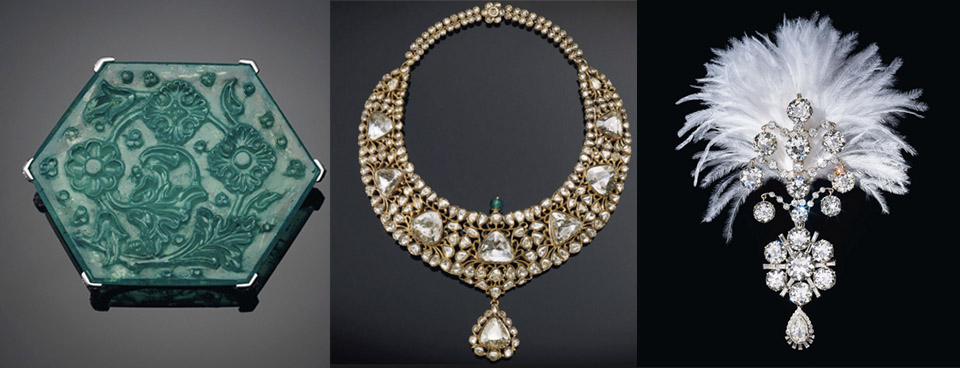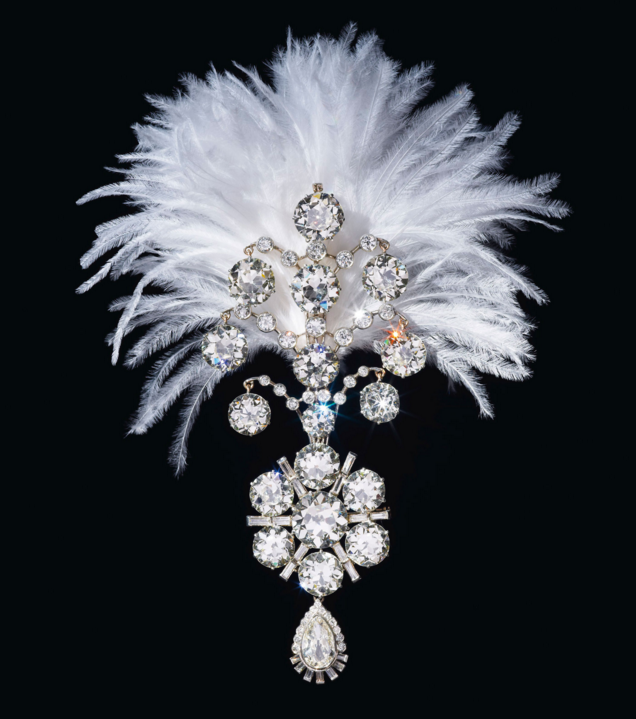A Royal Affair – Treasure Trove of Traditional Indian Ornaments at Christie’s Auction


A collection featuring 500-year-old royal Indian jewellery and ornaments will be going on auction at Christie’s in June.
With a rich history of extravagant ornamentation, India has attracted and inspired many magnificent pieces of jewelry. Some such historical jewels are set to make auction history in June at Christie’s. Offered from The Al Thani Collection, the objects date back almost 500 years to early Mughal rule and feature beautifully intricate pieces prized by Indian royals across history.
The Belle Époque Diamond Jigha


Traditionally called a jigha, this diamond encrusted turban ornament alternates as a brooch. The Belle Époque diamond jigha was first created in 1907 and then remodeled in 1935. It features old baguette and pear-shaped diamonds set in white gold, fitted with a plume holder on the other side. Maharajas would have worn it on formal occasions.
Gold Pen Case and Inkwell
The collection also includes a gold pen case and inkwell. Bejeweled with diamonds, rubies and emeralds, it is symbolizes knowledge, authority and power. Its importance was well documented in the Medieval Islamic times because of the importance of the written word in the Qur’an. Royal in nature, ceremonial inkwells were treasured by sultans.
The Nizam of Hyderabad Necklace
Made in the late 19th century, the Nizam of Hyderabad Necklace incorporates seven large foiled triangular table-cut diamonds in panels of rose-cut kundan set diamond leaves, along with green enamel. A triangular diamond pendant is mounted on the center with a melon-cut emerald. It is one of the most dazzling pieces of Indian princely jewelry.
The Patiala Ruby Choker
The Patiala Ruby Choker was commissioned by Maharaja Bhupinder Singh of Patiala. Made in 1931 by Cartier, it features 292 ruby beads weighing 356.56 carats with 132 threaded pearls between them, brought together a the ends with clasps of 120 diamonds and rubies set in platinum. It is a component of a larger necklace and is a splendid example Jacques Cartier’s lasting association with India.
Taj Mahal Emerald
Another instance of the Cartier-India association is the Taj Mahal Emerald. Inspired by the floral stone inlays and engravings of the Taj, it is a hexagonal-shaped carved tablet emerald of 141.13 carats. It was once the centerpiece of Cartier’s iconic necklace-shoulder ornament Collier Bérénice, which was exhibited in 1925 at the Exposition des Arts Décoratifs et Industriels Modernes in Paris.
More from our site
Recent Posts
The PEAKLIFE Regatta 2025
From fashion designer Varoin Marwah’s Coastal Calm SS '25 splash show to a thrilling nautical spin on the sea, it was a magical weekend in Mumbai
From fashion designer Varoin Marwah’s Coastal Calm SS '25 splash show to a thrilling nautical…
Inside Louisiana’s Biggest Festival: 10 Things You Didn’t Know About Mardi Gras
More than a party, Mardi Gras is a cultural phenomenon!
More than a party, Mardi Gras is a cultural phenomenon!
Design Your Dream Home With These Expert Tips
A home that’s stylish, cosy, and truly yours!
A home that’s stylish, cosy, and truly yours!
Luxury in Fiji: Indulge in Paradise
From private island resorts to lavish overwater bungalows, this South Pacific paradise seamlessly blends indulgence with natural beauty
From private island resorts to lavish overwater bungalows, this South Pacific paradise seamlessly blends indulgence…
A Traveller’s Quest: Soorahi
This premium blend whisky brand aims to reflect a spirit of exploration and evolution in India’s alco-beverage landscape
This premium blend whisky brand aims to reflect a spirit of exploration and evolution in…
What’s Buzzing: Fashion, Tech, and Travel Picks You Can’t Miss!
From star-studded fashion collaborations to luxurious getaways and cutting-edge tech, here’s everything making waves this week
From star-studded fashion collaborations to luxurious getaways and cutting-edge tech, here’s everything making waves this…


